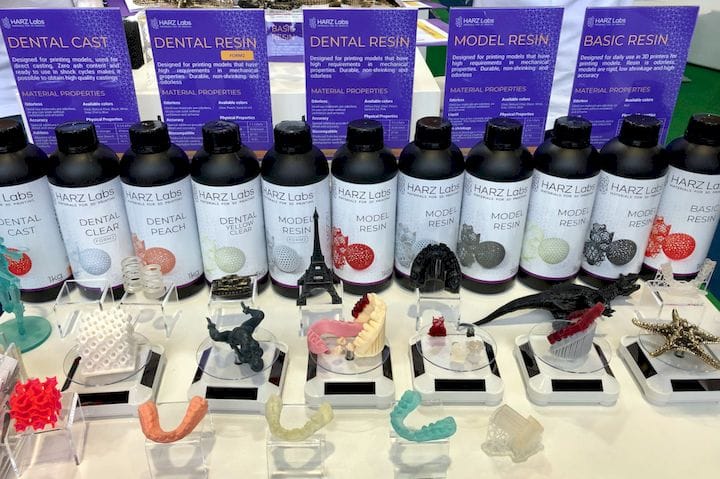![Some of Harz labs’ 3D printing resins [Source: Fabbaloo]](https://fabbaloo.com/wp-content/uploads/2020/05/harz-ov-1_result_img_5eb0a20859b33.jpg)
We encountered Harz Labs, a 3D printer resin manufacturer.
The Moscow-based startup company is a manufacturer of a comprehensive line of 3D printing resins, suitable for use in 3D printers permitting use of third party resins using DLP/LCD or SLA 3D printing processes.
The company started in 2017, apparently after five long years of polymer research. In 2018 they launched a warehouse in Riga, Latvia, to market to the West, as it is “too complex to sell from Russia”, according to their spokesperson.
![A beautiful resin 3D print by Harz Labs [Source: Fabbaloo]](https://fabbaloo.com/wp-content/uploads/2020/05/image-asset_img_5eb0a208b4d0b.jpg)
While you probably haven’t heard of Harz Labs, they did seem to be quite impressive when we spoke with them at formnext 2018. They explained they had been named “startup of the year” in a recent contest in Moscow, so others must think the same.
We saw a rather comprehensive line of 3D printer resins available, as you can see in the top image. Their product line currently includes:
-
Six dental resins, including one for casting
-
A modeling resin
-
A basic resin
-
A resin specifically designed for the Form 2
They also produce custom resins on demand for clients, and also appear to be developing both a nylon powder for use in SLS 3D printers, as well as a gypsum powder for other powder-based 3D printers.
![A very tiny 3D print made by Harz labs [Source: Fabbaloo]](https://fabbaloo.com/wp-content/uploads/2020/05/image-asset_img_5eb0a2090a257.jpg)
In this world of many different resin sources, we were somewhat skeptical of their viability. We asked them what makes their product different, so that it could stand out among many, many competitors. They had very good answers.
One was the price. Harz Labs charges around €80 (US$92) per liter, which is a very good price as compared to some that exceed US$200 per liter.
The other difference was, I think, more important. Their products:
-
Have no odor
-
Are non-toxic
-
Require no ventilation
This is quite a problem with many popular 3D printing resins, such that it requires the operator to certainly employ a significant ventilation apparatus when operating and even after during post-processing. Operators typically wear rubber gloves to avoid touching the nearly always toxic resins.
![A small 3D print made with resins from Harz Labs [Source: Fabbaloo]](https://fabbaloo.com/wp-content/uploads/2020/05/image-asset_img_5eb0a2094afda.jpg)
This toxicity has bothered me for some time; I always cringe when I see others handling “wet” resin 3D prints right out of the machine. I am hoping for someone to push a more safe resin for popular use.
Perhaps Harz Labs is that someone?
I asked them how they achieve this differentiation and they explained that they do not use any “cheap acrylates” as are often used in others’ products.
Safety first!
Via Harz Labs











A research thesis details the incredibly complex world of volumetric 3D printing. We review the highlights.